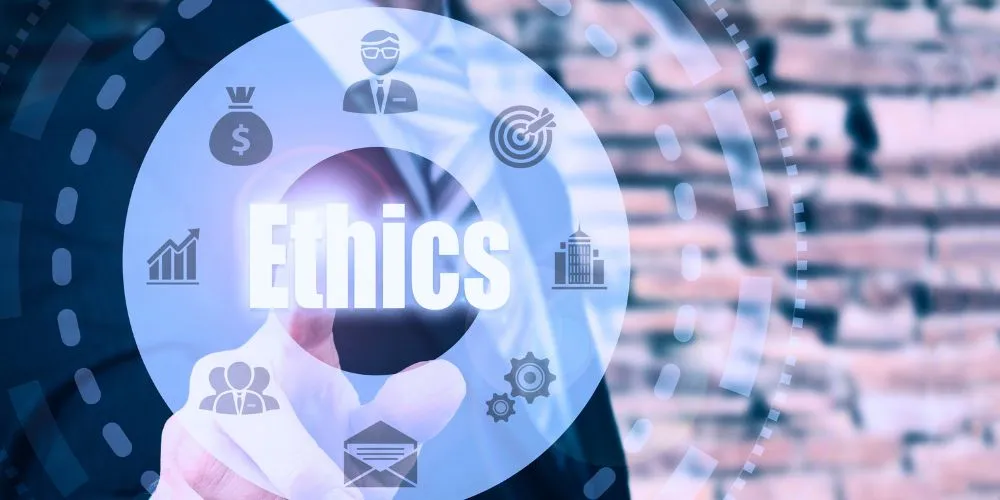IT Ethics, a critical aspect of the digital landscape, serves as the ethical compass guiding the responsible use of information technology. This article delves into the multifaceted realm of IT Ethics, exploring its fundamental principles, diverse dimensions, key advantages, notable applications, and the challenges it addresses within information technology’s dynamic and evolving landscape.
Unveiling IT Ethics
IT Ethics encompasses a set of principles and standards that dictate information technology’s responsible and ethical use. Rooted in values, it guides individuals and organizations in making ethical decisions concerning technology development, deployment, and use. The overarching goal is to ensure that technology serves humanity ethically, avoiding harm and promoting fairness, accountability, and transparency.
Key Components of IT Ethics
Understanding the key components of IT Ethics is essential for comprehending its comprehensive nature and impact:
- Privacy and Data Protection: IT Ethics places significant emphasis on respecting individuals’ privacy and protecting their data. It involves obtaining informed consent, implementing robust data security measures, and ensuring that personal information is handled responsibly.
- Cybersecurity Practices: Ethical considerations in IT extend to cybersecurity practices. IT Ethics encourages developing and implementing secure systems, protecting digital assets, and preventing unauthorized access or malicious activities that could harm individuals or organizations.
- Fair Use of Technology: Ensuring fair and equitable use of technology is a cornerstone of IT Ethics. It includes accessibility considerations, avoiding discrimination, and promoting inclusivity in the design and deployment of technology solutions.
Dimensions of IT Ethics
IT Ethics encompasses various dimensions that highlight its complexity and relevance in the digital age:
- Professional Ethics: Professionals in the IT industry are expected to adhere to a code of ethics that governs their behavior and decisions. It includes honesty, integrity, and a commitment to delivering high-quality, secure technology solutions.
- Social and Cultural Considerations: IT Ethics extends beyond individual actions to address broader societal and cultural implications. It involves considering the impact of technology on diverse communities, respecting cultural values, and avoiding the reinforcement of biases or discrimination.
- Environmental Sustainability: With the growing environmental impact of technology, IT Ethics includes sustainability considerations. It involves minimizing electronic waste, adopting energy-efficient practices, and developing technology solutions that contribute positively to environmental conservation.
Applications of IT Ethics
IT Ethics finds applications across diverse industries and technological domains, influencing how technology is developed, deployed, and utilized responsibly:
Artificial Intelligence and Machine Learning
In artificial intelligence (AI) and machine learning, IT Ethics is crucial for addressing concerns about bias, transparency, and accountability. Ethical AI practices ensure that algorithms are fair and unbiased and do not perpetuate discrimination.
Big Data and Analytics
IT Ethics plays a pivotal role in ensuring responsible data collection, analysis, and utilization in the era of big data. Ethical considerations involve obtaining consent, protecting privacy, and using data to benefit society without compromising individual rights.
Internet of Things (IoT)
The proliferation of IoT devices underscores the importance of IT Ethics in safeguarding user privacy and security. Ethical considerations in IoT involve transparent data collection, secure device design, and protecting users from potential risks associated with connected devices.
Social Media and Online Platforms
IT Ethics is particularly relevant in social media and online platforms. Ethical considerations include addressing issues of misinformation, protecting user data, and promoting healthy online communities while minimizing the negative impact of technology on mental health.
Advantages of IT Ethics
The adoption of IT Ethics brings forth a multitude of advantages, fortifying the overall trustworthiness, accountability, and societal impact of information technology:
Trust and Reputation Building
One of the primary advantages of IT Ethics is its role in building trust and maintaining a positive reputation. Ethical behavior in the IT sector fosters confidence among users, customers, and stakeholders, establishing a foundation of trust in technology solutions and service providers.
Legal Compliance and Risk Mitigation
IT Ethics ensures legal compliance by guiding organizations to adhere to relevant laws and regulations governing technology use. It, in turn, mitigates legal risks associated with unethical practices, protecting organizations from legal consequences and reputational damage.
Stakeholder Alignment and Collaboration
Adhering to IT Ethics fosters alignment with the values of various stakeholders, including users, customers, employees, and the broader community. Ethical practices promote collaboration and positive relationships, creating a conducive environment for innovation and sustainable growth.
Future-Proofing Technology Solutions
Considering ethical implications from the early stages of technology development helps future-proof solutions. Ethical IT practices anticipate potential challenges, societal concerns, and regulatory changes, ensuring that technology remains relevant and acceptable in the long term.
Challenges in IT Ethics
While the advantages are evident, the practice of IT Ethics faces its own set of challenges. Addressing these challenges is crucial for realizing the full potential of ethical considerations in the digital realm:
Rapid Technological Advancements
The fast-paced nature of technological advancements poses challenges for IT Ethics. Ethical frameworks may struggle to keep up with the rapid development of new technologies, leading to potential gaps in ethical considerations and responsible use.
Global Cultural Variability
Navigating cultural differences and varying ethical perspectives globally is a challenge in IT Ethics. What is considered ethical in one cultural context may differ from another, requiring a nuanced approach to address diverse values and norms.
Balancing Privacy and Innovation
Finding the right balance between privacy protection and fostering innovation poses a challenge. Ethical considerations in IT often involve striking a delicate balance to ensure the responsible use of technology without stifling progress and creativity.
Lack of Industry-wide Standards
The absence of consistent industry-wide standards for IT Ethics poses challenges. Organizations may struggle to align their practices with a universally accepted ethical framework, leading to variations in ethical considerations across the IT sector.
Future Trends in IT Ethics
As technology continues to evolve, future trends in IT Ethics point toward advancements that further enhance its capabilities:
Ethical AI and Algorithmic Accountability
The integration of ethical considerations into AI development is a growing trend. Ethical AI involves designing fair, transparent, and accountable algorithms, addressing concerns related to bias, discrimination, and the ethical implications of automated decision-making.
Increased Focus on Digital Inclusion
Future trends in IT Ethics emphasize the importance of digital inclusion. It ensures that technology is accessible to all individuals, regardless of socioeconomic status, geographical location, or other factors, promoting equity and fairness in the digital landscape.
Corporate Social Responsibility (CSR) in Technology
The future of IT Ethics involves a heightened focus on Corporate Social Responsibility (CSR) in the technology sector. Organizations must go beyond legal compliance and actively contribute to social and environmental well-being, aligning their values with broader societal goals.
Enhanced Ethical Education for IT Professionals
As technology becomes more ingrained in society, there is a growing emphasis on ethical education for IT professionals. Future trends involve equipping individuals in the IT sector with the knowledge and skills to navigate complex ethical challenges and make responsible decisions.
Conclusion
IT Ethics is a fundamental pillar in the responsible and ethical development, deployment, and use of information technology. Its role in guiding decisions, promoting fairness, and safeguarding societal values is indispensable in an era where technology shapes every facet of our lives. While challenges persist, ongoing advancements and future trends indicate a dynamic and promising future for IT Ethics, with applications extending into new frontiers of ethical AI, digital inclusion, and corporate social responsibility.
The responsibility to champion and uphold IT Ethics rests on individuals, organizations, and policymakers, urging them to navigate the digital landscape with a commitment to ethical principles for a more responsible and sustainable technological future.





